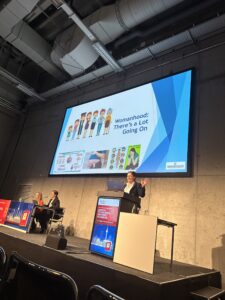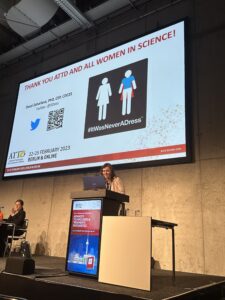Did you know that women and girls have been repeatedly excluded from research throughout history? In fact, after thousands of babies were born with severe birth defects from a medication for morning sickness, the Federal Drug Administration (FDA) banned women from participating in research if they were able to get pregnant.1
It’s understandable to want to prevent severe birth defects from happening to thousands of babies again, but that does not mean that women should be excluded from research. The challenge now is that there remains a large gap in research about women in general, but luckily there are many working hard to close that gap.2
At the Advanced Technologies & Treatments for Diabetes (ATTD) 2023 conference, there was an entire parallel session about managing glucose in the female population. This was a huge win for women since historically many of the sessions at professional conferences are only pregnancy-centric.
There were also sessions about pregnancy, particularly diabetes

Here are some highlights from that session:
- Women with diabetes have an increased risk of cardiovascular (heart and blood vessel) disease compared to men with diabetes.
- Women with T1D are more likely to have DKA (diabetic ketoacidosis) and are more likely to go into DKA when menstruating.
- Most women’s insulin is 40% less effective during the luteal phase of their cycle
- Women with diabetes have lower levels of estrogen compared to women without diabetes.
- More research on women with diabetes needs to be completed – especially in contraception, fertility, PCOS, sexual dysfunction, and menopause.
Dr. Eda Cegniz from University of California San Francisco discussed the use of apps to help track menstrual cycles and blood sugars to help identify patterns and adjust insulin. Dr. Darja Schweiger from Lubjca discussed cardiovascular risk factors for people with diabetes and the possibility of measuring thickness of part of the aorta as a predictor for cardiac disease. Dr. Chiara Fabris from UVA discussed her current research on modifying automated insulin delivery algorithms to account for menstrual cycle changes. This has not been studied in people yet but is looking promising in the simulator at UVA.
Dr. Dessi Zahareiva spoke about sex differences in diabetes and exercise, which is already a

- Males have an increased risk of low blood sugars during and after resistance exercise compared to females.
- Males have lower HbA1C compared to females in the 4T study at Stanford and in data from the worldwide SWEET data registry.
- In the 4T study, females reported more concern about unwanted attention from coaches related to diabetes and wanted to get advice on what snacks to eat to prevent lows where males were concerned about their diabetes devices being in the way of contact sports.
All of the fabulous female speakers at this session talked about the need for further research on women with diabetes throughout their lives, not just during pregnancy. Hats off to ATTD for doing these sessions to help continue the conversation about women with diabetes.
Written and clinically reviewed by Marissa Town, RN, BSN, CDCES



